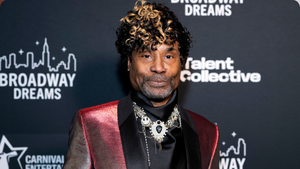Business executive Ayesha Kapur, dancer Navtej Singh Johar, journalist Sunil Mehra, chef Ritu Dalmia, and hotelier Aman Nath, all out LGBT people, are joining in the fight to repeal India's law criminalizing homosexuality.
They recently filed a petition with the nation's Supreme Court, demanding that the law be struck down on the grounds it violates their right to life, guaranteed by the nation's constitution, reports The Times of India.
The Supreme Court, which upheld the the criminalization law, Section 377 of the Indian Penal Code, in 2013, declined last week to hear their petition, telling them to take it directly to the nation's chief justice. But the work of these celebrities is adding to the momentum to repeal the law.
The five are not well known outside of India, but by being out in a country where gay sex is illegal, they face great risks but also have significant influence. Here's an introduction to them.
Johar (pictured, bottom right), a dancer in the classical Bharatanatyam style and winner of the prestigious Sangeet Natak Akademi award, plays a key role in challenging The 57-year-old recently discussed his life as a gay man in an interview with Indian publication Livemint. "Over the last decade or so, India has become far more relaxed about sexuality," Johar said, before going on to recall the abuse and pressure LGBT people face in the country. "I guess when people with some visibility step forward for a cause it has an impact -- that is why corporations have brand ambassadors. We are people who have contributed significantly to society in our own rights and are now stepping forward for our personal cause."
Mehra (not pictured), a renowned journalist, and art and culture critic, said he has been a victim of antigay hate crimes. He refrained from seeking government employment, reports First Post, for fear that he would face discrimination and violence for being gay. But he acknowledges the importance of being out. "We would be abdicating a moral responsibility if we didn't file this petition at this point in time," Mehra told another publication, Scroll.in. He and Johar are life partners.
It wasn't until her mid-30s that Kapur (top right), who attended college in the United States, was ready to tell her mother she is gay. Additionally, the fear of being outed and subsequently punished was enough for the rising corporate star to quit her job in Delhi. Even today, the risk of backlash keeps Kapur from taking her partner to public and social events, reports Legally India.
Dalmia (bottom left) is a world-renowned chef who owns seven restaurants in her Diva chain. Now employing over 250 people, the entrepreneur is an influential advocate for the repeal of Section 377.
Nath (top left) combined his passion for history, art and culture, and management to establish the chain of heritage hotels called Neemrana, which restore and protect historical properties. Nath and his late business partner, Francis Wacziarg, were in a committed relationship for 23 years, Press Reader reports. When probed about his relationship with Wacziarg, Nath told Grin News, "It's not always easy to explain this to people who have never had such an intense friendship that two people become one, but each one also remains complete."
Motivated by his experiences as a gay man, Nath decided it was time to address homophobia. "So, it began with the idea of adult education!" he said, according to Grin News. "Love cannot be criminalized -- hate, yes!"
Along with the celebrities, the Naz Foundation and similar advocacy groups are fighting for the law's repeal, making this is one of the few times in Indian history that people all over the country, regardless of race, age, or sex, have united for a cause.
The first lines of the petition read, "The petitioners are lesbian, gay and bisexual (LGBT) citizens of India whose rights to sexuality, sexual autonomy, choice of sexual partner, life, privacy, dignity and equality, along with the other fundamental rights guaranteed under Part-III of Constitution, are violated by Section 377."
"Despite their achievements and contributions to India in various fields, they are being denied the right to sexuality, the most basic and inherent of fundamental rights. Section 377 renders them criminals in their own country," the plea goes on.
Back in 2009 India's LGBT citizens donned celebration hats and cheered as the Delhi High Court ruled Section 377 unconstitutional. The court found it was an outdated, colonial-era statute that violated several fundamental rights, chiefly the right to equality, the right to freedom from discrimination, and the rights to life and liberty.
But the Supreme Court overruled the High Court in 2013, saying it does not have the right to change a law and that only Parliament can do that. The Supreme Court declared the ruling of 2009 legally unsustainable.
The Supreme Court's decision not to hear the petition is a setback, notes Reuters, but it remains to be seen what the chief justice will do. He is already hearing a separate case challenging Section 377. International pressure on India is building too.
"The pressure to repeal this law is rising as, for the first time, diplomats from 27 countries have issued a joint statement affirming their commitment to LGBTI rights," reports The Diplomat, a pan-Asian publication. It concludes, "A revisiting of this law will need to be as complex and layered as the myriad rights and experiences it would seek to protect."




































































Charlie Kirk DID say stoning gay people was the 'perfect law' — and these other heinous quotes